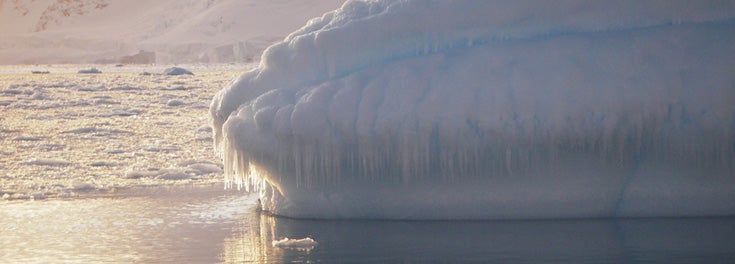
URI is breaking the ice—and, once again, breaking new ground.
A team of 17 University of Rhode Island faculty and students are headed to Antarctica for a month to study krill, the small crustaceans that hold a pivotal role in the Antarctic food web. They’ll be joined aboard the R/V Nathaniel B. Palmer, a 308-foot research ship with icebreaking capabilities, by six colleagues from University of Massachusetts. According to Oceanography Professor Edward Durbin, no one has attempted to conduct this type of study before.
How best to document this historic journey and invite us to join them? A daily blog. Here’s a recent entry.
Captain’s (b)log: “The excitement level is rising, frantic packing for both personal and scientific gear is underway. Everyone is very busy. While New England has gone into full on spring mode, with color and warmth everywhere, we are headed south to study krill in the southern ocean. Just in time to catch another very late autumn. Leaving the tulips behind, we revert to fewer daylight hours, as little as 4 hours of daylight when we hit our research area, the Western Antarctic Peninsula.
The goal of our project is to see how krill, the small crustaceans that hold a pivotal role in the Antarctic food web, survive in different seasons, including late fall/winter. We want to determine how active they are, where krill swarms reside, whether and how much they move, both vertically and horizontally, and how much and what they feed on. It is a big project and we have assembled a large team of collaborators. We’ll be sharing our experience through daily blog entries. Until we leave however, there will be frantic decision making. Did I ship the right caps for the sampling tubes? Should I bring a picture of a tulip?” ~ Susanne Menden-Deuer, associate professor of oceanography.
A team of 17 University of Rhode Island faculty and students are headed to Antarctica for a month to study krill. According to Oceanography Professor Edward Durbin, no one has attempted to conduct this type of study before.
Professor Menden-Deuer and other members of the research team will be sharing their observations and impressions throughout the journey, which promises to be a great adventure as well as an important research project. “Krill are the link in the food web between the plankton and whales,” said Professor Durbin, who’s leading of the team of 11 students and six faculty. “The fjords around Antarctica have large populations of krill. We’re interested in learning about the swimming and feeding behavior of krill in different prey environments. We want to know where they go, what they eat, and how they survive in different seasons, especially winter.”
One important question the team is hoping to answer is whether krill feed on the seafloor when there is little other food available. “There have been long discussions among scientists about what happens to krill during the winter when it’s dark,” said Durbin. “Do they sit there and slowly starve? One suggestion is that they might gain nutrition by feeding on the seafloor through the winter period. The timing of our cruise is good for examining that phenomenon because there won’t be much food in the water.”
The researchers will also use several bioacoustics devices, camera systems, and nets to try to calculate the size of the krill population in the region. “Numbers are really important. If you want to know how an organism functions in an ecosystem, it’s really important to know how many of them there are,” said Professor Menden-Deuer. “If you want to know how much food is available or how much plankton biomass they might consume or how much organic matter may be moving in the water column, it all depends on knowing how many organisms are out there.”
The scientists plan to return to Antarctica in November or January to conduct similar studies to compare their results to krill feeding behavior during the Antarctic summer when plankton will be abundantly available for krill to feed upon. Unfortunately, we don’t think there will be tulips in Antarctica then, either.
